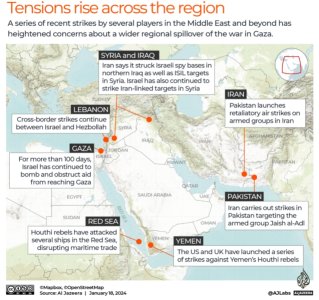- Joined
- Sep 11, 2023
- Runs
- 23,579
The past few years have indeed seen heightened tensions across various global regions. Since 2022, the conflict between Russia and Ukraine has persisted, leading to ongoing instability in the Eastern Europe. Additionally, tensions escalated between China and Taiwan, and subsequently between China and America due to disputes over a spy balloon. These conflicts have added to the geopolitical strain.
Last year, a devastating conflict erupted between Israel and Gaza, in which Israel registered new examples of war crimes and genocide.
Moreover, the middle east also witnessed escalating tensions between Iran and Israel, mainly manifested through support for Houthi rebels and incidents such as the explosions at the shrine of General Qasem Soleimani in Iran. These events intensified concerns about the broader implications of the conflict and its potential to escalate further.
Recently, there have been reports indicating tensions between South Korea and North Korea. This adds to the already volatile situation in East Asia, potentially exacerbating geopolitical tensions.
Are we on the brink of a third world war in practical terms?
Last year, a devastating conflict erupted between Israel and Gaza, in which Israel registered new examples of war crimes and genocide.
Moreover, the middle east also witnessed escalating tensions between Iran and Israel, mainly manifested through support for Houthi rebels and incidents such as the explosions at the shrine of General Qasem Soleimani in Iran. These events intensified concerns about the broader implications of the conflict and its potential to escalate further.
Recently, there have been reports indicating tensions between South Korea and North Korea. This adds to the already volatile situation in East Asia, potentially exacerbating geopolitical tensions.
Are we on the brink of a third world war in practical terms?
Last edited:














